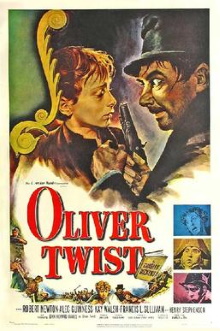So somehow I made it to middle-age without either reading Charles Dickens’ novel or watching any one of the numerous film adaptations even though like most people some of the scenes in it are so iconic that they are seared into my consciousness through cultural osmosis alone. This one is of course the grand-daddy of all the adaptations by David Lean. There have been other film versions before this but only this had any staying power and it influenced all other adaptations that followed.
A pregnant woman makes her to a Victorian-era parish workhouse and dies soon after giving birth without anyone knowing her name. The boy grows up as an orphan and is given the name Oliver Twist. He grows up to generally have a sweet and gentle nature but when the other boys pressure him into speaking up to ask for more food, he is sent to work at an undertaker’s where he has to sleep next to coffins. There an older apprentice bullies him and when he disparages his dead mother, Oliver attacks him in a rage and is punished. He decides to run away and eventually arrives in London. There he is almost immediately noticed by the street children and one the them, the skilled pickpocket known as the Artful Dodger, brings Oliver to his master Fagin who runs the gang of child criminals. Fagin starts training Oliver to be a pickpocket like the rest of them but meanwhile a mysterious man known as Monks starts taking an interest in Oliver’s background.
This tale is such a classic and conforms to the Victorian expectations of the morality play genre so closely that there are no surprises at every step of the way. Nonetheless it is still a real delight to watch this play out, such is the high bar that David Lean sets in his direction. The cinematography is exquisite as you can readily tell how much care was put into every detail of every shot. The cast is fantastic as well though I am amused that the character of Oliver Twist himself turns out to be such a non-entity. In modern movie parlance, he is the MacGuffin that everyone is looking for but doesn’t actually do much himself. I also love that the rogues of the story, Fagin, the Artful Dodger, the beadle Mr. Bumble who is charge at the workhouse, Bill Sykes the more hardened criminal and so on, are far more interesting and colorful characters than the trusting rich gentleman Mr. Brownlow or his motherly housekeeper Mrs. Bedwin. Yet this film makes it absolutely clear that they are not lovable rogues. They truly do have vicious, selfish motives underneath the surface charm and witty manners.
Looking beyond the adaptation at the story itself as written by Charles Dickens, it’s very clear though it must have spoken to people of his time, it feels so very dated now. Dickens meant this to highlight the hypocrisies of the time with its problems of child labor and unwanted orphans, but as we now know this presentation vastly understates the horror of the situation. Oliver Twist’s spartan living conditions here look positively benign set against the reality of factories employing child labor on a vast scale doing unsafe jobs that routinely lop fingers and limbs off children and cost them decades of their lives. At the same time the rich Mr. Brownlow is shown as being kindly and trusting, yet the level of privilege and power he assumes as a matter of course is astounding to see. He is able to walk through the streets of London with no fear at all for who would dare harm a gentleman and can readily call upon the police to act on his behalf as he wishes. This story contrasts the virtuousness of Brownlow and the people around him against the villainy of Fagin and Sykes. This adaptation famously made them look even worse by emphasizing Fagin’s Jew-like large nose. But Dickens never comes close to making the accusation that by being the people at the top of the pyramid of power, it must be Brownlow and his compatriots who must bear ultimate responsibility for the awful conditions at the lowest rungs of society.
Make no mistake, Oliver Twist is deservingly a great classic of English literature and this is an excellent adaptation that as I understand it, even improves upon Dickens’ text in some ways. You should absolutely watch it. But as great as he was, Dickens remains a person of his time and this adaptation exacerbates some of the shortcomings of that perspective. We should always be mindful of that.
